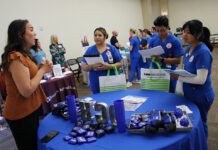MONTGOMERY, Ala. – Since November 2021, the Alabama Department of Public Health (ADPH), in collaboration with pediatric healthcare providers including hospitals who treat children and the Centers for Disease Control and Prevention (CDC), has been investigating an increase in hepatitis in young children. These children presented to providers in different areas of Alabama with symptoms of a gastrointestinal illness and varying degrees of liver injury including liver failure. Later analyses have revealed a possible association of this hepatitis with Adenovirus 41.
To date, nine children less than 10 years old have been identified as positive for adenovirus and two have required liver transplants. The affected children were from throughout the state of Alabama, and an epidemiological linkage among them has not been determined. None of these children has had any underlying health conditions of note.
ADPH issued a Health Alert Network (HAN) notification on February 1, 2022, to elicit additional cases, and ADPH is updating the HAN for redistribution. ADPH continues to collaborate with the CDC. Other entities working with ADPH include Children’s of Alabama and Texas Children’s. New York State Health Department Wadsworth Center and the Infectious Disease Pathology Branch at CDC have been performing the testing on the specimens in these cases.
CDC is developing a national Health Advisory looking for clinically similar cases with liver injury of unknown etiology or associated with adenovirus infection in other states and is discussing similar cases of hepatitis potentially associated with adenovirus with international colleagues.
Adenoviruses are common viruses that typically cause a mild, self-limiting flu-like or gastrointestinal illness. Rarely, in otherwise healthy individuals, do these viruses cause an illness so severe that they need to be hospitalized and may die.
Adenoviruses are usually spread from an infected person to others through:
· Close personal contact, such as touching or shaking hands
· The air by coughing and sneezing
· Touching an object or surface with adenoviruses on it, then touching your mouth, nose or eyes before washing your hands
· Contact with stool, for example, during diaper changing
Adenoviruses are often resistant to common disinfectants and can remain infectious for long periods of time on surfaces and objects. Basic steps individuals can take to protect themselves from getting sick are as follows:
· Wash your hands often with soap and water for at least 20 seconds, and help young children do the same.
· Avoid touching your eyes, nose or mouth with unwashed hands.
· Avoid close contact with people who are sick.
Sign in
Welcome! Log into your account
Forgot your password? Get help
Password recovery
Recover your password
A password will be e-mailed to you.


























